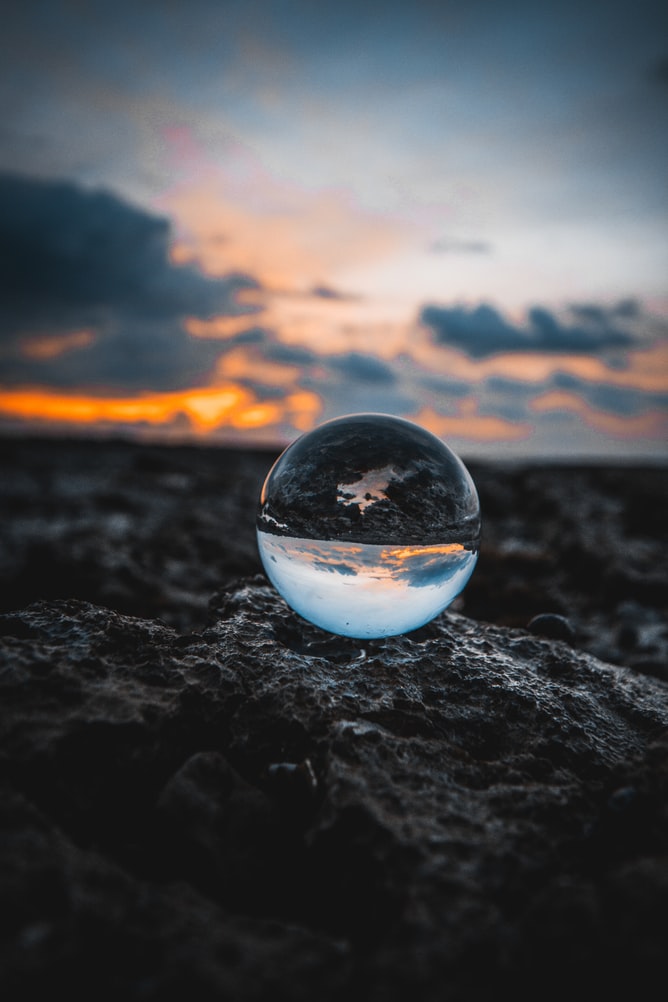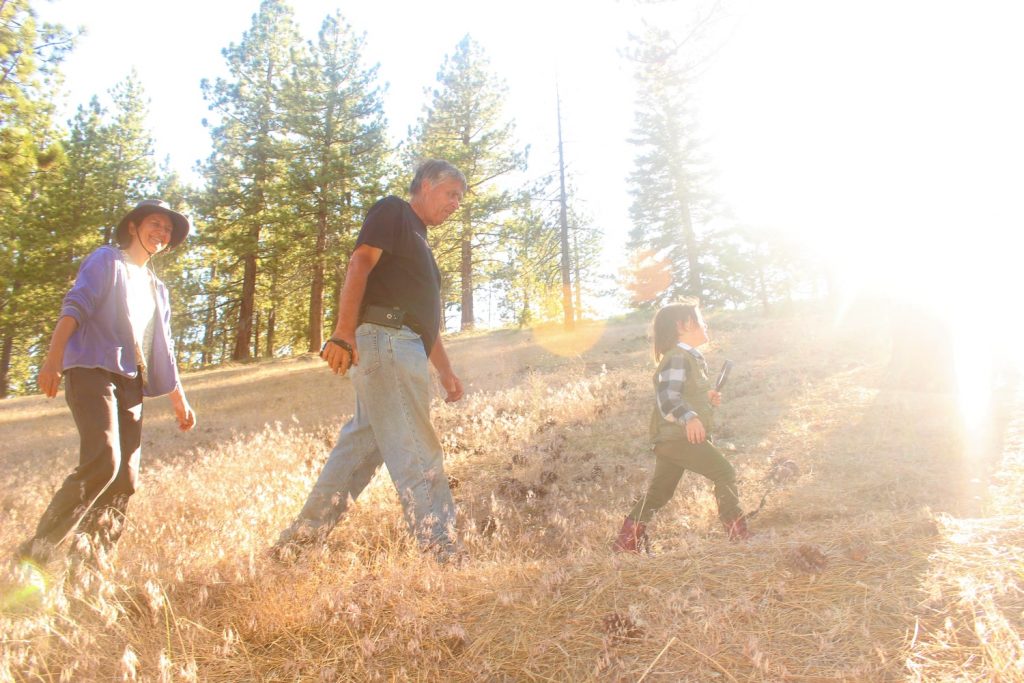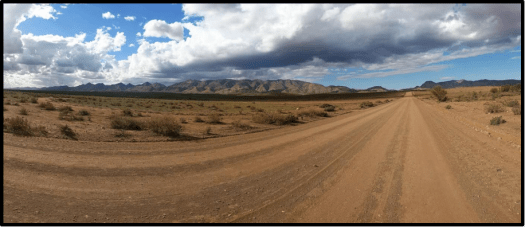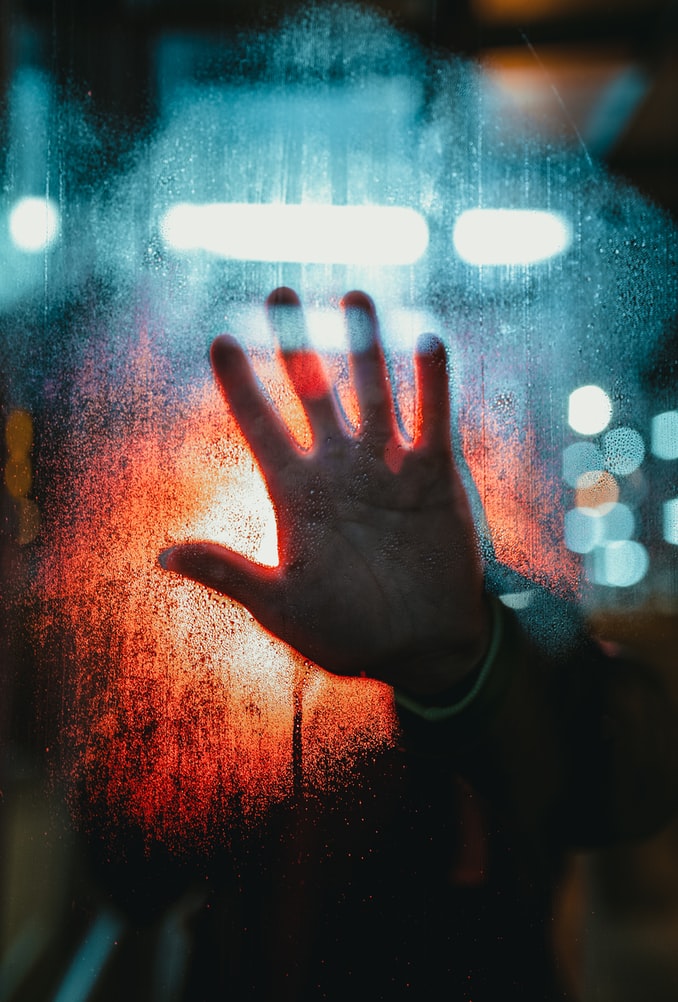The solitary diner at table 13 was Rosa’s last customer. He was a regular who wore Armani suits and left generous tips. As she placed his bill on the table, she noticed the red onion rings from the salad and the skin of the grilled salmon on the edge of his plate. His napkin was on his left and as always he had placed the knife and fork parallel to each other in the centre of the plate, pointing to twelve o’clock.
‘Today
is my last day here and you are our last customer.’
Bryon took his eyes off the journal and looked at Rosa and she said, ‘Perdón por molestarte.’
Bryon raised an eyebrow. ‘I beg your pardon?’
‘Oops,
I spoke Spanish. You are reading and I disturb. Sorry sir.’
‘I heard molest which… never mind.’
Rosa’s
face burned as she stacked his dishes on her forearm. Bryon wanted to know what
she had said before.
‘Just
that I lost my job here and no one is hiring waitstaff until the Covid-19
pandemic is over.’
Rosa
put the dishes back on the table and wiped her tears away with the back of her hands.
Bryon was intrigued. The girl was making fists and using the dorsum to wipe
tears like a small child. ‘Surely, there must be something else you could do?’
‘Yes. Cleaning, cooking, baby-sitting. But I don’t know anyone here.’ Rosa wiped her tears again.
‘If
you can’t find any other job, you could come and clean my house in Camberwell,
say for one hour each morning?’
‘Thank
you, sir.’
Bryon stood up and shook her hand. ‘I am
Bryon. Bryon Felix. You are?’
‘Rosa Maria Sanchez.’
Sitting in a train on the way home Rosa saw a Metro train map stuck above the window and checked how to get to Camberwell. Two trains to go there and with her luck, a bus from Camberwell station to Bryon’s house. She’d have to spend the whole day in trains and buses. She would ask Irma to talk to her boss again.
Irma was Rosa’s friend. Both had been radical political activists in Colombia a few years ago and had fled to Australia when the protest organisers were being killed. They had arrived in Darwin on working holiday visas for 12 months and had run away from Darwin when their visa expired. Since then they had moved from state to state doing any work they could find. They had come to Melbourne last year and shared a room in a rundown share-house in Reservoir.
That
night when Rosa came home Irma was kneading cooked corn meal to make arepas for
their dinner.
‘That puta, Neela, never cleans up the stove top after cooking her curries. We should say something to Neela. What do you think?’
‘Okay.’
‘Okay?
What type of answer is that? Look, I am going to stuff my arepas with cheese.
What do you want?’
‘I said, okay.’
‘Rosie,
what’s the matter? You didn’t hear anything I said.’
‘I
don’t have a job anymore. They said when we reopen, make sure to bring your
papers. I’ll never have papers. Why can’t I work with you? Make him give me a
job. Please?’
‘He’s not hiring, Rosa. But I’ll ask him again.’
‘A
customer offered me a cleaning job. Suppose I’ll take it. It’s the Armani guy.
Irma, here, look at his card. Wait, wipe the flour off your hand first.’
‘Bryon
Felix, Consultant Orthopaedic Surgeon, Southern Health,’ she read it out. ‘Must
be very rich to wear Armani suits.’
Each
day that she cleaned, it took more than two hours for Rosa to get to Bryon’s
house. Sometimes, she had to wait for up to half an hour until Dr Felix paid
her. The work was not hard and she didn’t mind the occasional wait.
One
day, Rosa found a $100 note on the sofa. She could buy shoes with it. This is
not stealing, she reasoned. Maybe he was drunk last night. Would he look for
it? Maybe it was not his? No, there weren’t any extra dishes in the sink this
morning. What if he is checking on me? What if he contacts the police?
‘Dr Felix, this was on sofa.’
‘Thanks, Rosa. Please call me Bryon.’
A few days later, Dr Felix asked her to come in the evening for three hours to clean and cook dinner for him. Five to seven. When Irma heard this, she warned Rosa to be careful.
‘Why
aren’t you looking for another job? You spend your whole day on trains. I think
he’s going to get into your pants.’
‘Irma,
he’s not like that.’
‘Ha?
Forgot what happened in Darwin? Here, keep this knife in your apron pocket all
the time. And keep the back door open.’
With
the new work arrangement, it made sense for Bryon to ask Rosa to eat dinner
with him. He liked this girl. She was clean and honest and funny. And she was
lovely.
Rosa took leftovers home for her lunch the next day. If she finished her chores early, she could watch TV or read a book. Best of all, she could play the piano. After dinner, Bryon said thank you, good night and went to his room. Rosa put the dishes in the dishwasher and went out the back door.
One evening, Rosa was about to untie her apron when she saw Dr Felix standing at the doorway looking at her. She was startled, for he never came into the kitchen. Her hand flew for Irma’s knife in her apron pocket. She looked at the back door. It was closed. He’ll grab me from behind while I try to open the door, just like in Darwin. Rosa gripped the knife tighter. This one will be dead before he touches me. I’ll stab right through his heart, she thought.
Bryon
saw Rosa’s pupils dilate and her chest heaving.
‘Hey,
I didn’t mean to scare you. I just popped in to ask if you could bring my
dry-cleaning tomorrow.’
‘Ah,
yes, of course.’
‘You
are bleeding,’ Bryon exclaimed.
Rosa followed Bryon’s eyes and saw a big red patch around her apron pocket. At the same time, her hand started to throb with pain. Dios mío! I am clutching the blade, not the handle. The red patch was getting bigger but she could not let go of the blade. There was a loud roar in her ears and everything became dark.
Up close, she saw clean white floor tiles. A bit further away, the tiles were dirty. They had dust balls on them. They were the tiles under the fridge. She was lying on the kitchen floor. Bryon’s voice drifted to her ears from above.
‘Let
me help you up. You fainted. You have a nasty cut on your palm. I’ve applied a
tourniquet to stop the bleeding.’
Bryon
held Rosa close to him and Rosa rested her head on his shoulder while he led
her to the bed in the guest room.
‘This wound needs stitches. Here, take these two capsules, they will numb the pain.’
Rosa
woke up with a throbbing pain in her palm. From the dim light of the night lamp
she saw that her palm was bandaged with white gauze. Her fingers poked out. I
can’t remember him bandaging my hand. Dios mío.
Heart
racing, Rosa stumbled into the bathroom and looked at herself in the mirror.
Her face was very pale but there were no bruises. She looked at her clothes.
She was wearing all her clothes and underwear. The buttons on her blouse were
all done. No buttons were missing or hanging loose. Her bra was fastened on the
first hook, just the way she always did. She felt for the string of her tampon.
No, she hadn’t been interfered with.
Gracias a Dios.
Rosa glanced at the clock. It was 8.30pm. She could get home
before eleven. She had just gone into the kitchen when Bryon came in. He was in
his pyjamas but without the maroon silk dressing gown he wore when Rosa arrived
in the mornings. She suppressed a sudden urge to smooth his dishevelled hair.
‘Rosa,
go in the morning. You might faint again.’
‘I am okay.’
‘You
don’t look okay. I put three stiches to close up that cut, you know.’
‘Thank
you, I am alright. Where’s your dry-cleaning receipt?’
As
she looked around for the receipt, the bench tops floated around her. She moved
backwards and leaned her back against the pantry cupboard. Her sore palm bumped
onto the edge of the cupboard and an intense lightning bolt of raw pain shot up
from the wound. A whooshing noise blocked her ears. Bryon went over to her.
‘You can’t travel tonight. If you really want to go home, I’ll have to drive you.’
The benchtops stopped floating but the whooshing noise persisted. ‘I’ll stay,’ Rosa said in a small voice. He’ll know why I had a knife. It’s because… No need to think about Darwin. I am safe here.
All the way home early the next morning, Rosa was smiling to herself thinking how Irma would tease her, not believing that she had slept alone in Bryon’s house overnight. But Irma wasn’t anywhere to be found. Their room was untidy and Irma’s side of the wardrobe was empty. Rosa ran and banged on her neighbours’ door.
‘Neela, Neela, Ravi, open the door please. Irma’s missing. Her clothes are gone.’
Ravi
came out of the room rubbing his eyes and closed the door behind him.
‘Police took her away. I think they are going to deport Irma. She was crying. They came around 2 o’clock. We couldn’t sleep after that.’
Rosa checked her phone, but there was no message from Irma. Terrified to contact Irma thinking it would give her away as well, Rosa gathered her belongings and went back to Bryon’s house. I’ll beg him to let me stay there until I find a place. I’ll work for nothing if he lets me stay.
Later
that night, Rosa received a text message from Irma on WhatsApp.
‘Police said a friend dobbed on me. That’s why you didn’t come home last night. They’ll come for you too. I thought you were my friend, you puta.’
Not
caring for repercussions, Rosa texted back saying, ‘Irma, please believe me, I
stayed here because I cut my hand and fainted. I don’t know how this happened.’
Rosa’s
message sat there in her WhatsApp, never reaching Irma.
Since
that day, Rosa had lived at Bryon’s house. She kept the house and the garden.
She tended to the orchids in the front yard and made a little herb garden at
the back. Bryon was the kindest person Rosa had ever met in her life. As she
did not have to pay rent or for transport and food, she saved money and bought
a bicycle.
I
could buy a small used car. But what’s the use? Without a visa I can’t get a
car registration or a licence. I am stuck.
One
night over dinner, Bryon told how his wife left him after three years of
marriage. He blamed himself for that. Those days, after finishing his theatre
lists in public hospitals, he’d do surgery in private hospitals. He came back
home around one in the morning or sometimes even later.
Rosa told him about her life in Colombia. Both her parents were school teachers. She was the only child. Even when she was a science undergraduate, she was an anticorruption activist. She was involved in protests against proposed reforms to the education system and later against austerity measures of the government. The government was corrupt and Rosa had been involved with a group who were planning to overthrow the government. She talked about the protests she and Irma had attended. She told how her parents borrowed money and sent her to Australia because the government was killing protest organisers.
‘I had a boyfriend, nothing serious.’ She
couldn’t talk about the Darwin incident or Irma’s deportation.
‘You must miss your family. When are you going to visit them?’
‘I can’t go there. I have no visa.’
‘I had no idea.’
Rosa
explained the application process and Bryon told he’d find a good lawyer for
her. Their platonic relationship changed sometime after that. Who fell in love
first was talked about at length but never resolved.
Rosa
was excited after securing an appointment with Kevin Flintheart, a famous
immigration lawyer in Collin Street. But the day before the appointment Rosa
woke up with a high fever and Bryon postponed the appointment. Although Bryon
suspected Covid-19, he could not risk taking Rosa to a hospital to be tested
because Kevin had said that no one must know her whereabouts yet. He had warned
that in case of an arrest and subsequent removal from Australia, it would be
near impossible for Rosa to return to Australia.
Rosa
was moved into the guest room and Bryon cared for her. He wore full protective
gear when he went to check on Rosa. He gave her strict instructions. Stay in
this room. No cooking. No cleaning. Don’t even go to answer the home phone. Use
disposable plates, cups and cutlery. He would bring food after work.
On
the first night that she felt well again, Rosa cooked a delicious Colombian
dinner. She could see that Bryon was pleased to see her up and about.
‘I
do shopping tomorrow?’
‘Rosa
Maria, listen to me. You can’t go out yet.’
‘You
buy bad vegetable,’ she pouted.
‘Vegetables.
Listen. Your visa appointment with Kevin is in three days. Please stay inside
until then.’
The
next morning, Bryon woke up cranky. He couldn’t eat his favourite breakfast of
eggs and chorizo. His tie was
askew and he let Rosa fix it. Saying, ‘Stay in, bye,’ Bryon drove off to work.
He
felt tired walking across the car park. He swiped his card and went in. The
corridor seemed unusually dark and much longer that morning. On his right was
the Pathology department. He wondered how many tests they had conducted during the last 24 hours. How many of them
had been positive? Concealed behind the Pathology was the morgue. He was proud
of the fact that he had not sent anyone there in his 30 years of service here.
‘You’ll
end up there yourself,’ an ugly inner voice told him. A cold shiver ran up and
down his spine. He should go back. But his legs carried him forward.
He
was startled as a nurse in full protective gear appeared from behind a little
alcove and motioned him to stop. He froze as she pointed a gun straight at his
forehead. Bryon had a terrible urge to reveal everything. Look, I have cared
for someone who was sick. I have been very careful. I haven’t put anyone in
danger. Please, don’t tell anyone. But no words came out of his mouth. The
nurse kept the gun very close to Bryon’s forehead with a steady hand. He held
his breath while his heart raced. The gun beeped and he took a step forward.
‘Mr. Felix, please stop. Mr. Felix? You are running a fever. Have you been in close contact with any confirmed or suspected Covid-19 cases?’
Bryon
was speechless. The nurse waited a few moments and pointed towards the alcove.
‘Please wait over there. I’ll call someone to take you to the fever clinic. They’ll test you for Covid-19. Standard procedure, I’m afraid.’
Covid-19? They’d quarantine him for two or three weeks. He should call Kevin and tell him what to do. Rosa mustn’t miss her appointment. His fingers kept pressing wrong buttons on the phone. He was light-headed and covered in a cold sweat by the time he managed to call Rosa.
‘Hola?’ He heard her sweet voice but found that he could not talk. The phone slipped from his hand and fell on to the tiled floor of the corridor. He heard the faint sound of hospital chimes and wondered why they weren’t loud as usual.
Rosa heard the phone clattering. Almost immediately she heard ear piercing chimes followed by a measured female voice saying, ‘Respond blue, corridor near Pathology.’ She then heard some hurried footsteps and soft murmurings before Bryon’s phone went quiet.
After
worrying and crying all through that day and the next, Rosa called Kevin.
‘Bryon
not come home two days now. He called yesterday but didn’t talk to me. After
that his phone’s not working. Something happened to him in the hospital.’
Later that day, Kevin rang Rosa and said that Bryon had suffered a stroke. He also had Covid-19 and no one could see him. Kevin would be in touch with Rosa. She should stay home.
Rosa had been waiting for days expecting a call from Bryon or Kevin when one evening a black car came to a sudden halt in the driveway. Rosa hid behind the curtains and watched. A well-built middle-aged man in a cheap black suit got out and strode towards the door. Rosa held her breath while he knocked. After a few minutes, he went back to his car. He stood looking around for a while before getting in and driving off. Immigration? A detective hired by Irma’s parents?
Ten minutes later, Rosa sprinted out of the side gate. She wore dark clothes and carried a large backpack. The rhythmic sound of her running feet faded away as she disappeared into the gathering darkness.






















